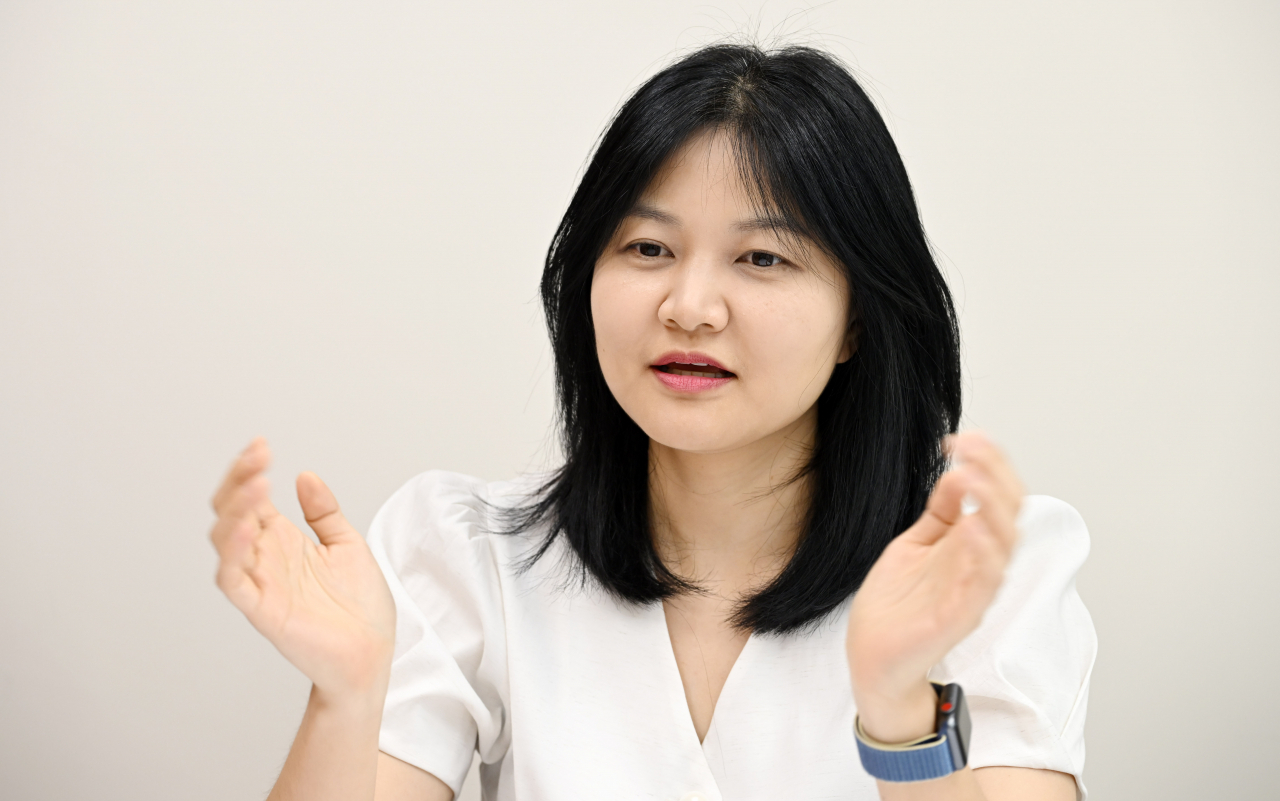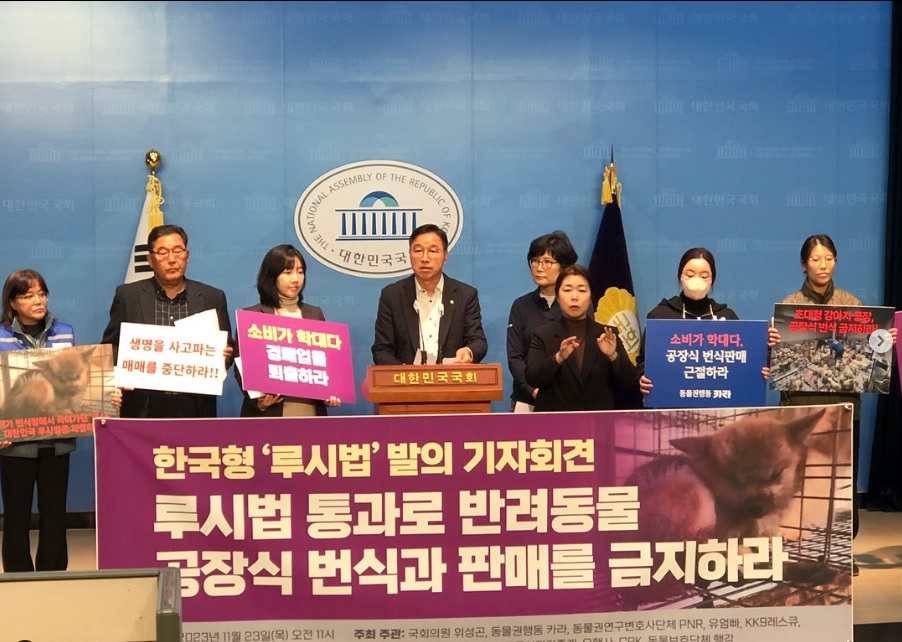 |
Lawyer Park Joo-yeon has an interview with The Korea Herald at law firm Apart in Seoul. (Lee Sang-sub/The Korea Herald) |
As a child, Park Joo-yeon always loved animals. She enjoyed going to the zoo and constantly pestered her parents to have pets at home.
In 2011, while undergoing training after passing the state bar exam, Park came across a horrendous photo that opened her eyes to aspects of animal life that she had not seen before.
It was of a piglet being subjected to a gruesome death by protesters opposing an army base relocation plan in Icheon, Gyeonggi Province. The incident, which took place in 2007, involved angry protesters applying an outdated punishment, traditionally used for treason, to the two-month-old piglet, tearing apart its head, arms and legs by force.
“I was horrified by the sight of the piglet dying painfully,” Park said of the encounter in a magazine published by animal rights group Kara. “From that moment, the more I learned about animal rights, the closer I could see (how humans mistreat and exploit animals.)”
Fast forward to 2024, Park is a member of the law firm Apart, specializing in civil and criminal litigation, corporate advisory and dispute resolution. She is qualified to practice law both in South Korea and in California.
Outside of work or on weekends, she does pro bono work to represent special “clients,” who range from cats and dogs to goats.
She is a co-founder of People for Non-human Rights, a group mainly of legal professionals dedicated to using their expertise to improve the legal protection of animals in the country.
Founded in 2017, PNR now comprises 15 lawyers, one veterinarian and over 100 citizen supporters. All the lawyers have their own legal practices, and the pro bono work for animals is conducted after hours or on weekends.
The first case Park got herself involved in was about a dog that was killed on a highway in 2012, while being dragged by a leash attached to a moving car. The dog belonged to the car’s driver, who placed it in the trunk because he didn’t want his car seat getting dirty. At some point while in motion, the dog got out the trunk (which was not closed) and was dragged by the leash, ultimately leading to its death.
Yet, the police which investigated the case decided not to press charges against the dog owner, saying there appeared to be no “intention” to harm the dog.
"No one took responsibility (for the dog’s death), and the excuse was too easily accepted,” Park said. “A couple of lawmakers and Kara held a press conference calling for a reinvestigation. But it did not take place."
In another case involving mountain goats, Park and fellow PNR lawyers pressed forward with a lawsuit in 2018, with 28 goats inhabiting Seoraksan as plaintiffs. The litigation sought to halt a governmental plan to construct a cable car line on the mountain, citing its potential to harm their habitat.
As widely expected, the court dismissed the case on the grounds that goats, as they are not legal persons, do not have the right to sue. Yet, the PNR lawyers' efforts helped raise public awareness about the environmental impact of the cable car construction. Still, the project was approved by the Cabinet last year.
 |
A press conference is held for the Korean “Lucy’s Law” proposal, led by then-Rep. Wi Seong-gon of the now-defunct 21st parliament, at the National Assembly building in Seoul on Nov. 23, 2023. (PNR Instagram) |
After several failed attempts to better protect animals within the current justice system, PNR lawyers now know where their main focus should be -- amending the laws.
For instance, the most basic law on animal rights, the Animal Protection Law, still views animals as "things" rather than "beings,” and has numerous loopholes.
During the previous National Assembly, which concluded its session in May, the PNR members collaborated with lawmakers to propose several revision bills. Some of them were adopted. Others are currently being considered by relevant ministries, Park explained.
During the interview, the lawyer shared that she was studying the possibility of enacting the Korean “Lucy’s Law.” This is a regulation enacted in 2018 in England to limit the sale of puppies and kittens as pets to address issues stemming from poor breeding practices.
Under current animal protection laws, breeders must obtain permission to produce animals for sale. But abuse by these certified breeders is massive, she said.
“Breeders without any veterinary knowledge cut open the bellies of mother dogs using box cutters, take out the puppies and then neglect the mothers,” she said.
When animal rights groups visited the breeding facilities after a tip-off from an insider, they found more than 100 bodies of dogs, she said.
Because breeders seek profit, they have clear incentives to produce more dogs with minimal costs.
“In one case, an owner had permission to breed 100 dogs, but they raised more than 200 in very poor conditions. The dogs were treated worse than objects,” she said, explaining why the Korean “Lucy’s Law” is needed.
As Park juggles between her roles of mom to a six-year-old boy and practicing attorney, the pro bono work for animals is sometimes challenging. She does not receive compensation of any kind for her legal advice in the animal rights field.
“But I can’t stop,” she said. “I have opened my eyes to animal issues, and know what the problems are.”
As a child, she wanted to become a lawyer who represents socially weak groups.
“I found the job of a lawyer fascinating after reading a biography of Jeon Tae-il written by lawyer Cho Young-rae," she said.
Jeon (1948-1970) was a factory worker who set himself on fire to call for basic labor rights to be upheld. His death brought awareness to the plight of laborers, but Kim also believes it was lawyer Cho who spotlighted Jeon's story, represented his rights and made people start to listen.
“I was moved by Cho, who saw the dark side of society and did what was right. I also wanted to represent socially weak groups," she said. "Animal welfare and abuse are not entirely unrelated to human society. Abuse of animals can also lead to crimes against humans."
A society that pays more attention to the rights and welfare of animals is a better place for humans to live, she added.







![[Weekender] Korea's traditional sauce culture gains global recognition](http://res.heraldm.com/phpwas/restmb_idxmake.php?idx=644&simg=/content/image/2024/11/21/20241121050153_0.jpg)